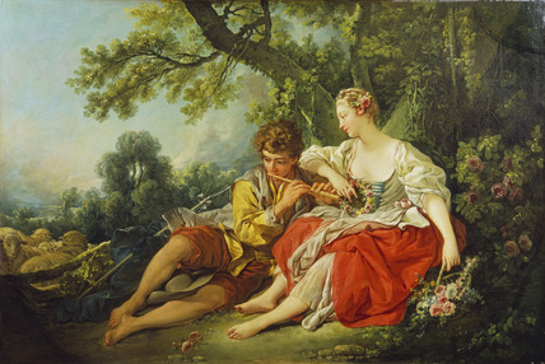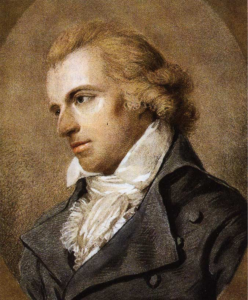Enchantment with Laura
(Poet's title: Entzückung an Laura)
Set by Schubert:
D 390
Schubert did not set the stanzas in italics[March 1816]
D 577
Schubert did not set the stanzas in italics[August 1817]
Laura, über diese Welt zu flüchten
Wähn ich, mich in Himmelsmaienglanz zu lichten,
Wenn dein Blick in meinem Blicke flimmt.
Ätherlüfte träum ich einzusaugen,
Wenn mein Bild in deiner sanften Augen
Himmelblauem Spiegel schwimmt.
Leierklang aus Paradieses Fernen,
Harfenschwung aus angenehmern Sternen
Ras ich in mein trunken Ohr zu ziehn,
Meine Muse fühlt die Schäferstunde,
Wenn von deinem wollustheißen Munde
Silbertöne ungern fliehn.
Amoretten seh ich Flügel schwingen,
Hinter dir die trunknen Fichten springen,
Wie von Orpheus Saitenruf belebt,
Rascher rollen um mich her die Pole,
Wenn im Wirbeltanze deine Sohle
Flüchtig wie die Welle schwebt.
Deine Blicke – wenn sie Liebe lächeln,
Könnten Leben durch den Marmor fächeln,
Felsenadern Pulse leihn,
Träume werden um mich her zu Wesen,
Kann ich nur in deinen Augen lesen:
Laura, Laura mein!
Wenn dann, wie gehoben aus den Achsen
Zwei Gestirn, in Körper Körper wachsen,
Mund an Mund gewurzelt brennt,
Wollustfunken aus den Augen regnen,
Seelen wie entbunden sich begegnen
In des Atems Flammenwind, – – –
Qualentzücken – Paradiesesschmerzen! –
Wilder flutet zum beklommnen Herzen,
Wie Gewapnete zur Schlacht, das Blut,
Die Natur, der Endlichkeit vergessen,
Wagts mit höhern Wesen sich zu messen,
Schwindelt ob der acherontschen Flut.
Eine Pause drohet hier den Sinnen
Schwarzes Dunkel jagt den Tag von hinnen,
Nacht verschlingt den Quell des Lichts –
Leises.. Murmeln… dumpfer… hin.. verloren..
Stirbt… allmälich.. in den trunknen… Ohren…
Und die Welt ist…. Nichts….
Ach, vielleicht verpraßte tausend Monde
Laura, die Elisiumssekunde,
All begraben in dem schmalen Raum;
Weggewirbelt von der Todeswonne,
Landen wir an einer andern Sonne,
Laura! und es war ein Traum.
O dass doch der Flügel Chronos harrte,
Hingebannt ob dieser Gruppe starrte
Wie ein Marmorbild – die Zeit!
Aber ach! ins Meer des Todes jagen
Wellen Wellen – über dieser Wonne schlagen
Schon die Strudel der Vergessenheit.
Laura, it is as if I am escaping out of this world,
That is what I imagine, in order to immerse myself in the heavenly glow of May,
When our eyes meet and your gaze shimmers in mine,
I dream that I am absorbing ethereal breezes,
When in your gentle eyes my image
Swims in your sky-blue mirror;
The sound of lyres in distant Paradise,
The sway of harps from more attractive stars,
Those are the sounds I am passionate my ears should be turned towards,
My muse can sense the ‘heure du berger’,
When, from your passionately warm mouth
Silver notes reluctantly escape;
I watch cupids flapping their wings,
Behind you the drunken spruce trees are dancing
As if brought to life by the call of Orpheus’ strings,
The poles swirl around me more rapidly
When your feet, in their whirling dance,
Swirl around as fleeting as a wave;
Your glances, when they smile with love,
Could stir marble into life
And provide a pulse for the veins in rocks,
Dreams will become true around me
If only I can read in your eyes:
Laura, Laura is mine!
Then, when, like, spinning out of their axes,
Two stars grow together, body merging with body,
Burning rooted mouth to mouth,
With sparks of delight streaming from their eyes,
Souls encounter each other as if in alliance
In the flaming wind of breath,
The rapture of agony – the pains of paradise!
It flows more wildly towards the apprehensive heart,
That blood, like an armed soldier going into battle,
Nature, forgetting finitude,
Dares to take on higher realities
And fades on account of the waters of Acheron.
Meaning is here threatened with a pause,
Black darkness pursues the day from behind,
Night devours the source of light –
Gently . . a murmuring . . . softer . . gone . . . lost . . .
It dies . . . gradually . . . in the drunken . . . ears . . .
And the world is . . . nothing . . .
Oh, perhaps a thousand months passed by,
Laura, in that Elysian second,
All buried within such a narrow space (of time);
Whirled away from the delight of death,
We land on another sun,
Laura! and it was a dream.
Oh, if only Chronos’ wings would wait,
Oh that time might be bewitched by this grouping and freeze
Like a marble statue. Time!
But oh! Waves are chasing waves into the sea of death,
Wave upon wave – Over this delight you can already hear the sounds
Of the whirlpool of oblivion.
All translations into English that appear on this website, unless otherwise stated, are by Malcolm Wren. You are free to use them on condition that you acknowledge Malcolm Wren as the translator and schubertsong.uk as the source. Unless otherwise stated, the comments and essays that appear after the texts and translations are by Malcolm Wren and are © Copyright.
☙
Themes and images in this text:
Blue Dancing Dreams Ether Eyes Feet Fleeing Flying, soaring and gliding Gazes, glimpses and glances Harps and Aeolian harps Heaven, the sky Lyres Magic and enchantment Marble May Mirrors and reflections Mouths Near and far Orpheus Pictures and paintings Silver Spruce trees Stars Stringed instruments (unspecified) Swaying and swinging Swimming Waves – Welle Wind Wings
One of the ironies of much love poetry is that it tends to tell us more about the subject, the persona who claims to be in love, than about the love object; there is no mutual exchange, however many protestations there are that the beloved is more significant than the lover. In the case of Schiller’s Laura poems, we can be fairly certain that any actual 18th century woman (the main candidates are widows or married women) who inspired him to equate her with Petrarch’s Laura did not reciprocate the poet’s feelings. The text is an imagination of how the world would appear if ever Laura returned his love.
He imagines, he feels, it appears. This is the context of the first stanza, where the poet ‘dreams’ of what it would be like if their eyes met and he saw his own reflection swimming in the sky-blue mirror of her eyes. Swimming would turn into soaring as he escaped the Earth’s gravity and bathed in the heavenly glow of a May day, sucking or breathing in ethereal breezes. He knows that this is not happening (‘Wähn´ ich’ could be translated as something like ‘I am deceived into believing that’), so he is not totally bewitched or enraptured yet. He still has sufficient self-knowledge to realise that fantasy and reality are different. When, much later in the poem, the spell fully takes hold, he begins to lose coherence and becomes inarticulate. Music is the unifying theme of the second stanza. He wants to hear (he does not say that he can hear) the music of Paradise or from other worlds. This allows his poetic muse to interpret the sounds coming from Laura’s lips as the silvery notes of a lover. He realises that this is a bucolic moment, but again his description of this intuition is based on a cultured, very self-conscious analysis of his situation. He uses the term ‘die Schäferstunde’, the ‘shepherd’s hour’, which refers to the sort of love scene popular in 18th century stories (and figurines) involving shepherds and shepherdesses. Although this idea was shared throughout rococo culture (as in the pictures of Boucher and Fragonard), the word itself was unique to German (and in fact the relevant German Wikipedia entry is one of the few articles on that site that currently has no equivalent in any other language: https://de.wikipedia.org/wiki/Schäferstündchen).

Wallace Collection, London
From music it is a small step to dance, the unifying theme of stanza three. The writer creates a vertiginous world that is twisting and swaying. Solid spruce trees are part of the dance and the stars that revolve around the pole star seem to accelerate, all because Laura swings her foot. Such is her power to transform everything around her that we could easily believe that she could make marble come to life or make the veins in the rock pulsate. The usual distinction between inanimate and animate nature has broken down because of the ‘charm’ or ‘spell’ that she has cast. This is the ‘enchantment’ she has brought about: Entzückung an Laura.
☙
Original Spelling Entzückung an Laura Laura, über diese Welt zu flüchten Wähn ich - mich in Himmelmayenglanz zu lichten, Wenn dein Blick in meinem Blicke flimmt, Aetherlüfte träum´ ich einzusaugen, Wenn mein Bild in deiner sanften Augen Himmelblauem Spiegel schwimmt. Lezerklang aus Paradieses Fernen, Harfenschwung aus angenehmern Sternen Ras´ ich, in mein trunken Ohr zu ziehn, Meine Muse fühlt die Schäferstunde, Wenn von deinem wollustheißen Munde Silbertöne ungern fliehn - Amoretten seh' ich Flügel schwingen, Hinter dir die trunk'nen Fichten springen Wie von Orpheus Saitenruf belebt, Rascher rollen um mich her die Pole, Wenn im Wirbeltanze deine Sole Flüchtig wie die Welle schwebt - Deine Blicke - wenn sie Liebe lächeln, Könnten Leben durch den Marmor fächeln, Felsenadern Pulse leih'n, Träume werden um mich her zu Wesen, Kann ich nur in deinen Augen lesen: Laura, Laura mein! Wenn dann, wie gehoben aus den Achsen Zwei Gestirn, in Körper Körper wachsen, Mund an Mund gewurzelt brennt, Wollustfunken aus den Augen regnen, Seelen wie entbunden sich begegnen In des Atems Flammenwind, - - - Qualentzücken - Paradiesesschmerzen! - Wilder flutet zum beklommnen Herzen, Wie Gewapnete zur Schlacht, das Blut, Die Natur, der Endlichkeit vergessen, Wagts mit höhern Wesen sich zu messen, Schwindelt ob der acherontschen Flut. Eine Pause drohet hier den Sinnen Schwarzes Dunkel jagt den Tag von hinnen, Nacht verschlingt den Quell des Lichts - Leises.. Murmeln... dumpfer... hin.. verloren.. Stirbt... allmälich.. in den trunknen... Ohren... Und die Welt ist.... Nichts.... Ach, vielleicht verpraßte tausend Monde Laura, die Elisiumssekunde, All begraben in dem schmalen Raum; Weggewirbelt von der Todeswonne, Landen wir an einer andern Sonne, Laura! und es war ein Traum. O daß doch der Flügel Chronos harrte, Hingebannt ob dieser Gruppe starrte Wie ein Marmorbild - die Zeit! Aber ach! ins Meer des Todes jagen Wellen Wellen - über dieser Wonne schlagen Schon die Strudel der Vergessenheit.
Confirmed by Peter Rastl with Friedrich Schillers sämmtliche Werke. Zehnter Band. Enthält: Gedichte. Zweyter Theil. Wien, 1810. In Commission bey Anton Doll. [korrigierter Druck] pages 66-67; and with Gedichte von Friederich Schiller. Zweiter Theil. Zweite, verbesserte und vermehrte Auflage. Leipzig, 1805. Siegfried Lebrecht Crusius, pages 88-89. This is the final (third) version of Schiller’s poem, where he suppressed all but the first four stanzas.
To see an early edition of the text, go to page 66 [72 von 310] here: http://digital.onb.ac.at/OnbViewer/viewer.faces?doc=ABO_%2BZ207858305


